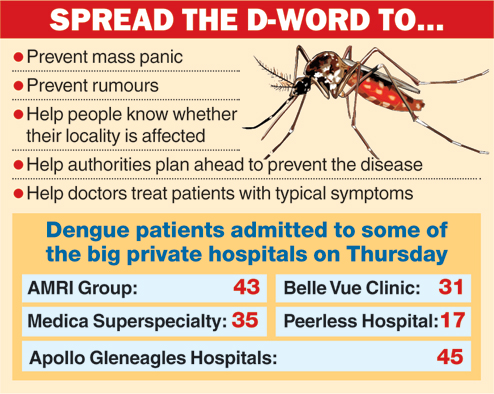
The Union health ministry said this week that 23 people had died of dengue in Bengal since January. Some officials in Bengal said, off the record, that the toll could be more than 30. In the state government's studied silence lies the real sting in the tale.
Midway through the dengue outbreak, the state health department stopped updating the death toll as well as the number of new cases detected. The unofficial reason, a senior official said, was to prevent panic.
But public health experts and government officials in at least two other cities affected by dengue said they preferred a little panic rather than complacency.
Dissemination of information about the disease is meant to ensure that apart from government officials, citizens and doctors treating patients are fully aware of the prevailing situation.
Regular updates about dengue cases, deaths and the affected zones help people to take precautions necessary to keep the disease from spreading like it has done in Bengal this year.
A senior official of the National Vector Borne Disease Control Programme said dissemination of information was critical to quick follow-up action and feedback that helps prevent the disease from becoming a full-blown threat to public health.
"People panic and rumours spread when no information is available from the authorities rather than the other way round. People will never panic if a piece of information comes from a reliable source like a government body," said Anand Krishnan, professor of community medicine at AIIMS, Delhi.
In Delhi, about .01 per cent of the population has been affected by dengue this season, which shows that the spread of the disease isn't as high as it is perceived to be. "Exact numbers give the true picture. Then people can take rational decisions, based on a rational perception of the threat," Krishnan said.
Since dengue is a notifiable disease in India, concealing information to prevent panic is contrary to the recommended and established practice.
The state health department has asked all health care organisations and pathology laboratories to submit daily reports on dengue detection. But if that information is not collated and put in the public domain, the purpose of collecting data might not be served.
Several doctors whom Metro spoke to said they had come across patients either overreacting or not reacting at all to symptoms of dengue.
There have been instances of patients dying because they did not seek proper treatment at the right time despite having fever and other dengue symptoms. In dengue management, daily surveillance of several parameters makes the difference between quick recovery and life-threatening complications.
In other states where dengue is endemic, governments have been publishing data and spreading awareness through various methods such as door-to-door visits and advertisements across media.
"We are reporting the number of dengue cases and deaths every day on our website so that everyone knows. This will prompt people to be more careful and take precautionary measures," said B.G. Prakash Kumar, joint director of the vector-borne disease control programme in the Karnataka health department.
Until Thursday, Karnataka had reported around 3,000 dengue cases and six deaths this year, he said.
In Delhi, health department officials said they had been routinely reporting the number of dengue cases and deaths through the municipal bodies and their own awareness cell. "The municipal bodies provide daily updates. We also initiate door-to-door visits where people are told about the symptoms of dengue and other vector-borne diseases so that there is no unnecessary panic," said Tarun Seem, director-general of health services in Delhi.
Bengal's health department hasn't uploaded any update even on its website. An official at Swastha Bhavan, the headquarters of the department, said weekly figures were being sent to the Union health ministry.
On August 29, chief minister Mamata Banerjee said in the Assembly that six persons had died of dengue in Bengal. "It happens that some regions are affected more by an outbreak.... The disease was more ferocious in Delhi last year and in Kerala the year before.... In Bengal, six persons have died of dengue (this season) in government hospitals," Mamata, also the state's health minister, said while speaking on a motion by Opposition parties accusing the government of not doing enough to contain the outbreak.
That was the last time any official figure was announced. Minister of state for health Sashi Panja did not take phone calls from Metro. Neither did the director of health services, Biswa Ranjan Satpathi.










